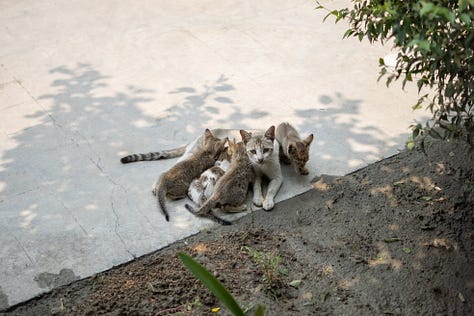Disconnect For Connection
In this newsletter, I share details on the loneliness epidemic, how loneliness impacts our health, and what we can do about it.



Hi Wunderfully Well family,
Welcome back to a new week where we can, as always, aspire to be our healthiest and happiest selves.
Loneliness has become an increasingly discussed topic in recent times, which seems ironic as we are connected digitally now, more than ever. While I've personally experienced loneliness in my childhood and early adulthood, it's a feeling that has diminished as I've grown older. However, it's evident that loneliness is turning into an and has been called an epidemic that affects millions of lives in the United States. According to the The U.S. Surgeon General’s Advisory on the Healing Effects of Social Connection and Community, “Loneliness is far more than just a bad feeling—it harms both individual and societal health. It is associated with a greater risk of cardiovascular disease, dementia, stroke, depression, anxiety, and premature death. The mortality impact of being socially disconnected is similar to that caused by smoking up to 15 cigarettes a day.” Recognizing the profound implications of loneliness on our overall health and well-being, it's crucial that we take steps to combat it and cultivate fulfilling and abundant relationships that contribute to our health and happiness.
In addition to the statistics mentioned, loneliness can also lead to the following:
Impacts on Physical Health: Loneliness has been linked to unhealthy behaviors like poor diet, lack of exercise, and substance abuse, all of which can contribute to physical health problems.
Increased Risk of Mental Health Issues: Loneliness and social isolation increase the chances of developing mental health problems such as depression and anxiety. A lack of close relationships can contribute to feelings of sadness and despair.
Stress and Chronic Health Conditions: Loneliness can result in chronic stress, which, over time, may contribute to the development of various chronic health conditions, including heart disease, diabetes, and a weakened immune function.
Cognitive Decline: Some research suggests that social isolation and loneliness may be related to cognitive decline and an increased risk of conditions like Alzheimer's disease.
Reduced Longevity: Studies have shown that social isolation and loneliness are associated with a higher risk of mortality. Having close relationships is often linked to a longer, healthier life.
Elevated Risk of Substance Abuse: Loneliness and a lack of close relationships can drive individuals toward substance abuse as a way to cope with their emotional pain and feelings of isolation.
It can often be difficult to make friendships and connections as an adult. We spend less time with people compared to our childhood years, juggling familial and work commitments. In the United States, in particular, we lack communal spaces and gatherings, unlike the plazas common in European countries, and spend too much time in our cars. Additionally, with the rise of the work-from-home movement, we're exposed to fewer in-person interactions than ever before.
I believe that having smaller social networks and being exposed to fewer people can be troublesome because we may inadvertently place too much pressure on one or a few people to meet our diverse relational needs. For example, a romantic partner cannot be all of the people we need in our life to feel fulfilled: a best friend, a co-worker (when working from home), a life partner. This can put too much pressure on one person and can cause resentment or disconnection over time. Additionally, for those with smaller networks, If one person were to exit our lives for any reason, this then puts a lot more pressure on those that are currently in our lives. If I have three close relationships in my life and one leaves, this adds an additional load to those that I love and want to support just as much as they support me.
Though loneliness is an epidemic, there's hope for change. While we may not have control over broader societal trends like the work-from-home movement or others' choices in how they interact with people, we can take responsibility for how we engage with others today. Here are some tips to minimize loneliness and build supportive, fulfilling relationships:
Dedicate Time for Meaningful Connections: Make an effort to maintain regular, frequent, and meaningful interactions with friends and family. Whether in person or through phone and facetime, create a daily practice of connecting with loved ones.
Enhance the quality of your time spent with others by reducing distractions during conversations. Avoid checking your phone during meals with friends, significant discussions, and family gatherings. Speaking from experience, staying present and focusing on the people in front of me has had profoundly positive impact on the health of my relationships.
Practice Responsiveness and Gratitude: Show responsiveness, offer support, and nurture gratitude in your interactions. When you incorporate these behaviors, others are more likely to reciprocate, strengthening your social connections, enhancing relationship satisfaction, and expanding your social resources.
Engage in Social and Community Activities: Join social and community groups, including fitness, religious, recreational, professional, and community service organizations. These affiliations help foster a sense of belonging, significance, and purpose.
Minimize Isolating Behaviors: Identify and minimize behaviors that contribute to feelings of isolation. This includes excessive use of social media, unhealthy relationships, and an over-reliance on screens at the expense of real-life interactions.
It may seem scary to put yourself out there to create and build new relationships, but I can almost guarantee that others are looking for the same. We might be afraid of the other person perceiving us negatively when we reach out for connection, but I often remind myself that no one is thinking about me and my behavior as much as they are about theirs. I hope this newsletter inspires you to take time to be present and appreciate the wonderful relationships that currently exist in your life and also, if needed, find the courage to build and create more :)
Have a great week ya’ll.


